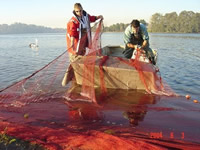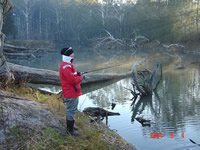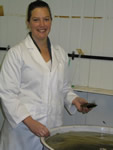|
Where did you grow up and go to school?
I grew up in Ulverstone and went to Leighland Christian School.
What inspired you to do science?
At primary school I was interested in all kinds of science (although I didn't know it was science at the time!). I always wanted to know more about the things around me and would ask lots of questions about 'how' and 'why'. For example, I wondered how the bees made honey, what were all the different animals in the rock pools, why did my brother have blue eyes and mine were hazel, how could the sponges that washed up on the beach have ever been alive, and all sorts of questions about the world around me.

I also developed a keen interest in the ocean. Many of our family holidays were spent camping near beaches, and we often went fishing. I loved being out in the boat and was intrigued by all the different fish. I was always amazed when dolphins and seals came to the surface and swam around our boat. At high school, my interest in marine science was cemented during a science trip to the Woodbridge Marine Science centre. While we were there I saw sharks, fish, crustaceans, shellfish, starfish, and zooplankton through a microscope. I had no idea what zooplankton were, or even how a microscope could allow you to see things so small, but I was hooked!
 What did you study at uni?
What did you study at uni?
At University I studied marine science, and moved to Hobart to complete a Bachelor of Science with a major in Marine, Freshwater and Antarctic Biology. During this time I learned a great deal about the marine environment, the types of animals living in it and their interactions with each other, and how we as humans use and manage ocean resources. During this time I became more and more interested in the impact that we have on these resources and whether they were being used sustainably.
This lead me to complete an Honours project looking at the biology of flathead in the Tamar estuary in Launceston. From local observations, there appeared to be only small flathead in the Tamar, so I wanted to know if this was really true, and if so, why? I collected many flathead for the study, to examine their age, growth and reproduction, and discovered that flathead use the Tamar estuary as a nursery area. It seems they don't live there for long, but move in when they are small and move out again when they are ready to reproduce.

Where did you work after graduating?
After finishing my Honours project, I secured a job in Sydney working for the NSW Department of Fisheries as a fisheries technician. This job was working on a black bream project and a luderick project, examining their biology and population structure. Recreational and commercial fishers commonly catch both species, but their biology and life-history had not been studied in NSW. This means that the regulations used to manage this fishery were not based on scientific knowledge, but on estimates from other species or other areas. Through this research I was able to contribute to the improved knowledge of the biology and life-history of these species, and potentially contribute to the sustainable use of these resources.
What are you researching now?
Recently an opportunity arose for me to gain a better understanding of aquaculture. Rather than using the wild populations we have in the oceans, aquaculture uses fish or shellfish that are grown on a 'farm'. So, for my PhD I am examining reproduction and broodstock conditioning in mussels. At the moment mussel growers collect juvenile mussels from the wild and grow them up for market on longlines, but depending on nature to reliably produce enough juvenile mussels for the aquaculture industry is limiting the growth of this industry. The first step in producing juvenile mussels in a hatchery is to have reproductively mature adults that can be spawned under controlled conditions, so my project is about researching the best way to produce juvenile mussels in a hatchery.
After the completion of my PhD, I plan to continue working in scientific research, with a focus on continuing to look for better ways to produce or harvest seafood, in a sustainable way that allows the continued use of these resources for generations.
What do you love about science?
My research allows me to investigate and solve problems, and this is what I love most about science. Finding the solution to problems and answers to questions. I have always wanted to know more about nature and the world around us, and have always been asking questions. Being a scientist allows me to continue wondering about nature and the world, and provides the satisfaction of discovering the answers myself.
|
|
